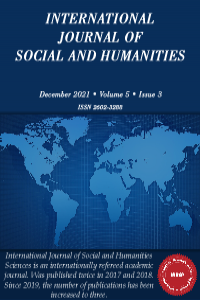CORPORATE GOVERNANCE AS A STRATEGIC TOOL TO EFFICIENT WATER SUPPLY CHAINS: A CASE OF MABVUKU-TAFARA SUBURBS OF HARARE, ZIMBABWE
Abstract
Lack of Corporate Governance in Water Supply Chain Management affect service delivery leading to sluggish societal development. Water crisis has contributed much to marginalization of the vulnerable in society and outbreak of healthy chal-lenges such as waterborne diseases. Exploitable water sources, if properly exploit-ed, lead to adequate water supplies for domestic consumption. The purpose of this exploratory case study was to explore if the respondents felt Corporate Governance tenets were in use and how these could embedded in the management culture to en-sure seamless water supply provision. A sample size of 98, randomly selected from a targeted population of 400 subjects for representativeness from Mabvuku-Tafara Suburbs of Harare. Ninety-three questionnaires were randomly distributed and 62 responses retrieved. Researchers used a snowball-sampling technique to identify interviewees for the study. SPSS was used for data analysis and Atlasti.9 software. The study found out that water crisis was still a perennial issue. Households relied on unprotected water sources. A few respondents sourced water from private com-panies into the business of bottled water. Women and young girls were sexually abused they queued for water deep into the night. The study recommends adoption of corporate governance principles in water supply chain management to meet in-ternational best practices in water provision for the good of all citizens. Revamping the existing water infrastructure, use of e-procurement systems to eliminate unethi-cal practices in the buying of chemicals to purify water and promotion of a culture of tolerance were some strategies that could enhance service delivery.
Keywords
Corporate Governance Water Supply Chain Management Exploitable Water sources Marginalization
References
- 17 Goals, 1 Future (2018). How the UN Sustainable Development Goals can be reached in and within Norway by 2030, 26 Forum, GROSET 18/02/2015)
- Abumoghli, I., and Goncalves, A. (2019). Environmental Challenges in the MENA Region, UN.
- Al-Saidi, M., and Saliba, S. (2013). Water, Energy and Food Supply Securi-ty in the Gulf, MDPI.
- Geere, J.-A., and Cortobius, M. (2017). Who carries the weight of water? Fetching water in rural and urban areas and the implications for water security. Wa-ter Alternatives 10(2): 513-540.
- Guth, K (2016). Institutional Theory of Organizations, SAGE Publications Ltd.
- Hudson, B.A., Creed, W. E.D., and Okhuysen, G.A. (2015). Power and In-stitutions: Stones in the Road and Some Yellow Bricks, SAGE.
- IFAC. (2013). Good Governance in the Public Sector- Consultation Draft for an International Framework, IFAC.
- IOD (2016) King IV Report on Corporate Governance for South Africa, IOD.
- Jenks, G.F. (1967). The Data Model Concept in Statistical Mapping, Interna-tional Yearbook of Cartography, 7.
- Kulkani, R., and Balasundram, M. (2014). Corporate Governance, Indian Perspective, International Journal of Trade Economics and Finance, Vol.5 (4).
- Letza, et al., (2008). Corporate Governance Theorising: Limits, Critics and Alternatives, International Journal of Law and Management, Vol. 50(1).
- Makwara, E.C., and Tavuyanago, B. (2012). Water Woes in Zimbabwe’s Urban Areas in the Middist of Plenty: 2000 –Present, European Journal of Sus-tainable Development (2012), 1, 2, 151-180 ISSN: 2239-5938.
- Manzungu, E., and Mabiza, C. (2004). Status of Water Governance in Urban Areas in Zimbabwe, Some Preliminary Observations from the City of Harare, Phys-ics and Chemistry of the Earth, Vol.29.
- OECD. (2016). Preventing Corruption in Public Procurement, OECD Task Force (2016:7).
- Peters, M.A., et al., (2011). Creativity at the Global Knowledge Economy, Peter Lang.
- Saunders, M., Lewis, P., and Thornhill, A. (2009). Research Methods for Business Students, Pearson Education, Essex.
- Sheu, C., and Lin, R., (2012). The role of Institutional Environment in Mar-keting Channels, Journal of Marketing, Vol.66, No. 3.
- Siljeg, A., et al. (2016). Accessibility Analysis of Urban Green Spaces in the Settlement of Zadar (Croatia), ResearchGate.
- Statutory Instrument 144 of 2019, (Chapter. 22:11), Public Finance Management (Treasury Instructions) Section 16, GoZ.
- Thanasak, R. (2013). The Fraud Factors, International Journal of Manage-ment and Administrative Sciences (IJMAS) (ISSN: 2225-7225) Vol. 2, No. 2, pp. 01-05.
- The Constitution of Zimbabwe Amendment (No.20), 2013, GoZ.
- UN. (2012). Preventing Corruption in Public Administration: Citizen En-gagement for Improved Transparency and Accountability, UN, New York
- WHO. (2019), Water for Life, www.un.org/waterforlifedecade/pdf/humanright/
- Mostepaniuk, A. (2017). Corporate Governance, ResearchGate
- OECD. (2017).Access to Water and Sanitation in Sub-Saharan Africa, As-sessment of water loss in Harare, Zimbabwe, OECD Journal on Budgeting Volume 7 – No. 1, ISSN 1608-7143
- UNDP. (2013). Water and Ocean Governance, UNDP.
Details
| Primary Language | English |
|---|---|
| Journal Section | Research Article |
| Authors | |
| Publication Date | December 31, 2021 |
| Published in Issue | Year 2021 Volume: 5 Issue: 3 |


